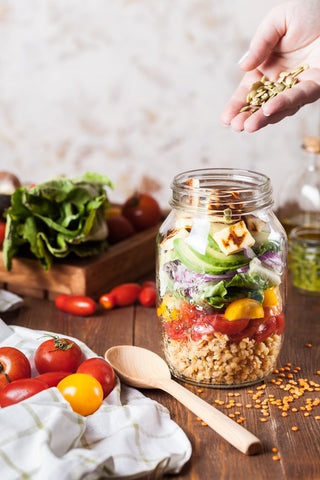Meal prep: how it works!
Yes, it sounds newfangled. Yes, it is often done by athletes. And yes - it's healthy too (if done correctly):
meal prep
Meal prep is good old pre-cooking. The term comes from English and is an abbreviation for Meal (= dish) Preparation (= preparation).
In plain language: You pre-cook dishes that you want to eat on the following days. So you know exactly what's in your food and don't have to stand in the kitchen every day. Sounds good, right?
However, despite the obvious benefits, there are a few things to keep in mind when it comes to meal prep. What's the best way to go about it and what other options are there? Do you find out now!
What is meal prep?
First things first: There is no perfect way to do meal prep. While one prepares only one breakfast at a time, the other plans his whole week around the prepared dishes.
Of course, the English equivalent “meal prep” sounds hipper than “pre-cooking” and is considered “cool”, especially in sports circles. A few years ago, with the beginning of the healthy lifestyle boom, many fitness enthusiasts in the USA began to prepare their food and take it with them everywhere in fancy lunch boxes - as a countermovement to the readily available (unhealthy!) fast food.

It goes without saying that it was only a matter of time before Meal Prep found its way to Germany. There are now countless recipes, tips and instructions on the Internet that almost glorify Meal Prep.
How does meal prep work?
The basic principle is simple: Ideally, you decide on one day a week that you make your meal prep day. It is best to go shopping the day before and plan exactly which dishes you want to prepare - this way you have a good overview.
The most important thing about meal prepping is that planning is half the battle! If you generally prefer to make spontaneous decisions about what to have for lunch, meal prep may not be best for you. Because there is no point in eating your prepared food even though you don't feel like it - and that's just because it's too good to throw away.
It's also best to start slowly and maybe not prepare for the whole week, but only for three days. In this way you avoid an overcrowded fridge in which you have no more space for other things besides countless Tupperware cans.
In addition, you should (as always) pay attention to balanced meals. About 50% of your meal should be complex carbohydrates, 30% healthy fats, and 20% protein. You can also read more about it at theGerman Society for Nutrition .
 If, on the other hand, you already know that meal prep doesn't give you enough time, but you still don't want to do without a balanced diet, take a look at our organic ready meals . We attach great importance to a good nutrient profile and the dishes are prepared in just three minutes.
If, on the other hand, you already know that meal prep doesn't give you enough time, but you still don't want to do without a balanced diet, take a look at our organic ready meals . We attach great importance to a good nutrient profile and the dishes are prepared in just three minutes.
Difficulties with meal prep
Having ready-to-eat meals already in the fridge sounds tempting – sure. Nonetheless, there are some things to consider, including the question, “How do I know what to store and for how long?” It is not uncommon for you to take your prepared food to work, which has already gone bad because it has been in the fridge for a day too long...
To avoid this, there are a few rules you should follow. This reduces the likelihood of food becoming inedible.
- Suppose you cook on Sundays. It is then best to plan fresh salads or vegetables that should still be crisp for Monday and Tuesday. If you wait too long before you eat your salad, it will collapse - unfortunately after three days there can no longer be any talk of freshness. For salads, it is also a good idea to take dips or dressings with you in separate jars so that the leaves do not become soggy.
-
Spinach, fennel or beetroot must also be eaten promptly. Otherwise, the nitrate it contains is converted into toxic nitrite – which is carcinogenic.
- For example, stews or cooked dishes are suitable for the middle of the week. So boiled rice with fried tofu and vegetables would be a good choice. It keeps well in the fridge for up to three days. Important with rice, quinoa or other grain basics: only cook them al dente. If you cook them all the way through, they will quickly become mushy when you warm them up... But you could easily avoid this problem by giving our Löwenanteil side dishes a chance.

- Patience, patience, patience: After you have prepared your dishes, you have to wait and see. Of course, we'd love to put them in the cans ready to eat - but if you do that while they're still warm, you run the risk of them swelling further. The reason: they are still in the condensation that comes from warm food. On the other hand, if you wait too long, the likelihood of dishes going bad and bacteria growing increases. By the way: The growth of bacteria and mold can only be prevented at temperatures below 4 degrees.
- If you want to keep dishes for longer than 3-4 days, it is best to freeze them. Note, however, that vegetables with a high water content, potatoes and dairy products are very difficult to freeze. When it comes to defrosting, there are also a few things to consider: It is better not to defrost them at room temperature, but in the refrigerator or in the microwave. This means that pathogens cannot spread so easily.

What equipment for meal prep?
In order not to lose the taste of your painstakingly prepared meals, you should store the individual components of the respective dish separately in the refrigerator. Only put them together on the day you want to eat them. This will also prevent everything from getting muddy together. What you need: space in the fridge.
Containers that you can use for storage should always be resealable. It doesn't matter whether it's glass or plastic. When the time comes and you head to work, you can either put the meal in a mason jar or invest in a box that has several small unit doses. The most important thing is still that everything stays tight. After all, who wants to have sauces in their handbag?
What Are the Benefits of Meal Prep?
The two biggest advantages are undeniable:
1. You know what's inside. How often do you go to the bakery to get a bun - without knowing exactly what the ingredients are? Don't worry, this happens to everyone once in a while. But isn't it all the nicer to know that we can avoid exactly that? If you dare to do meal prep, you only eat things that you really want to eat. Even when you're on the go. It also makes it easier for you to stick to your nutrition plan.
 2. You save time. By preparing your meals in advance, you can cook less during the week and have more free time. What is often forgotten, however, is that the day you do meal prep is all about cooking! It often takes a few hours when you can't do anything else because you have to wait for the lentils to finish cooking or for the vegetables to cool.
2. You save time. By preparing your meals in advance, you can cook less during the week and have more free time. What is often forgotten, however, is that the day you do meal prep is all about cooking! It often takes a few hours when you can't do anything else because you have to wait for the lentils to finish cooking or for the vegetables to cool.
Who is meal prep suitable for?
If any of the above benefits made you think “oh wow, that sounds awesome!”, it may be for you! But if you work a lot or travel a lot, meal prep may be too time-consuming for you. Because even if the result (ready-to-eat, delicious meals) actually speaks for itself, it is a lot of work that you have to invest. Beginning with the information about the preparation up to the discipline to actually do it. It is often the case that motivation is still very high when meal prep starts, but decreases over time.
Meal Prep is ideal for anyone who doesn't want to give up healthy eating. Meal prepping also teaches you how to combine different foods without getting bored.
As you can see, meal prep takes time. Not only for cooking, but also for gathering information. If you don't have them, we have an alternative suggestion for you: With our dishes, we are aimed precisely at those who don't have much time, but who still value healthy nutrition and a good nutrient profile.

Our organic ready meals are warmed up just as quickly as pre-cooked meals. You can also see which ingredients are included and you can decide whether chilli, curry or lentil stew fits into your diet. Löwenanteil differs from meal prep in fundamental ways:
- You have no cooking effort → you save time because the dishes are ready in just 3 minutes
- It's much easier → you don't have to acquire any knowledge, you can spend your free time doing other things.
- In the best-case scenario, you save money → A glass of the Löwenanteil is enough for two servings if you eat a side dish with it. This means that a portion price of €3.50 is possible. With our storage pack even €3.27 plus rice.
- ideal nutrient profile → you don't have to calculate how many nutrients your meal contains - we've already done that. We use 100% natural organic food. All of our dishes have a balanced ratio of high-quality proteins, healthy fats and complex carbohydrates.
Oh, and by the way: Unopened, our dishes can be kept for up to a year. You can store them dry so that there is still enough space in your fridge. Tupperware paradise? Not with us!
Meal prep à la Löwenanteil: No cooking effort, yet as healthy and delicious as homemade!





